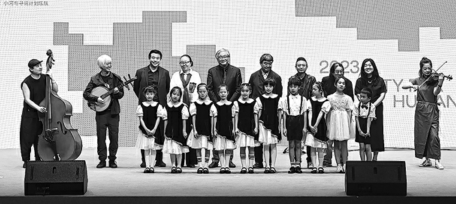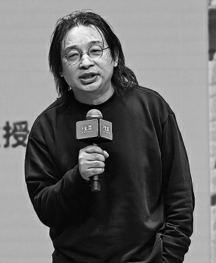Experts at Chengdu gathering find space to discuss

On Oct 26, the second Sanlian City for Humanity Forum was held in Chengdu, Sichuan province. The annual forum, organized by Sanlian Life Weekly, was themed "Cities and Us: Public in Flux". It aimed to explore the changes and possibilities of the public sphere brought about by the wave of digital technology and the multilayered connotations and creativity of public spaces after being used and interpreted by different groups of people.
Eight speakers from the fields of architecture, art and humanities were invited to discuss public spaces and publicness in cities from their different disciplinary backgrounds and perspectives. They explored how the experience of urban life can be approached from a human-centered perspective.
Dai Jinhua, professor from the Department of Chinese Language and Literature at Peking University and a film researcher, notes that film art is an essential part of urban life. The process of watching a film is metaphorical, where strangers gather at the cinema and then part ways, enjoying a similar experience and gaining different insights.
"Cinemas bring us together. The cinema itself is one of the important modern spaces," she says.
Professor at MIT School of Architecture and Planning, Yung Ho Chang, discussed the responsibilities and rights of architects, citing the example of his design of the China Academy of Art Liangzhu Campus.
Unlike most colleges and universities, where dormitories, teaching buildings and other areas are separate, the buildings on Liangzhu Campus are connected by a passage and different areas are distributed between floors.
Chang explains that, when the expectations of the new generation of young people regarding architecture and campus life have changed, architects will focus more on the kind of design that can accommodate multiple needs and inspire more possibilities.
Senior urban planner Li Xiaojiang indicates that, in the process of urban planning, urban space and services should be available for people from different backgrounds, cultures and identities. Inclusiveness can be a source of urban vitality, he adds.
Architecture critic Zhou Rong, associate professor at the Department of Architecture at Tsinghua University, also points out the significance of openness and inclusiveness in architecture design.
Zhou says: "Much of the logic of planning and designing our cities, to this day, has been born purely from a visual perspective." He cites the example of Pingshan Performing Arts Center in Shenzhen, Guangdong province, where the space is, uniquely, offered not only to showgoers who can enter the venue, but also to those who cannot afford the tickets. The latter have access to the exterior part of the center, where they can sit down, dance and relax.
Speaking of the changes in the way people perceive cities in an era of fast-paced technological advances, Fei Jun, professor at the Central Academy of Fine Arts and a cross-media artist, presented cases combining art and technology, for example, a piece of equipment that enables people to talk to water. The equipment uses an artificial intelligence program to analyze people's emotions in their voiceprints, and then makes the water — through different types of rippling — respond to these varied emotions.
With such cases, Fei explains, it shows the possibility for people to go beyond their physical limitations to experience and interact with their city.
Wang Min'an, a professor at Tsinghua University's School of Humanities, anthropologist Xiang Biao, and musician Xiao He also shared their views.
The forum was followed by an awards ceremony where five prizes — centered around public spaces, architectural contribution, community building, eco-friendliness, and urban innovation — were bestowed upon different projects. The Mengzhuiwan Upgrade and Renewal Program in Chengdu was awarded this year's special prize.
Li Hezi contributed to this story.








Today's Top News
- Ukraine says latest peace talks with US, Europe 'productive'
- Economic stability a pillar of China's national security
- Xi taps China's deep wisdom for global good
- New rules aim for platforms' healthy growth
- Chinese web literature grows overseas
- Postgrad exam trend points to thoughtful approach






























